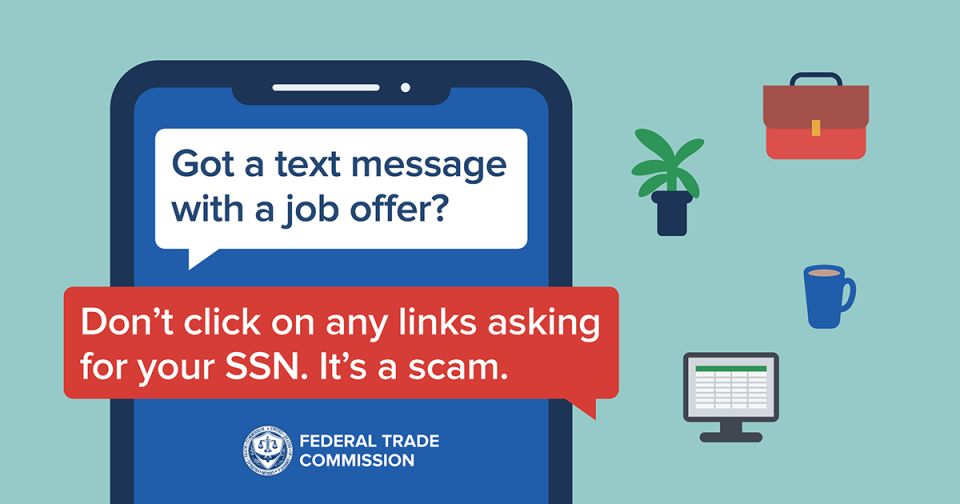You get a text message with a job offer that pays hundreds of dollars a day for doing remote work. It might sound tempting, but here’s the catch: they ask you to text them your Social Security number. Don’t share it. It’s a scam.
Scammers are sending texts on WhatsApp, pretending to offer remote jobs for positions like online data specialists. They promise they’ll pay up to $600 a day, but the company hiring is a total mystery. The text only says the job’s age requirement and asks for a valid Social Security number. Before you act, know this: not only is the job not legit, but if you send your information, the scammer can use it to steal your identity and create serious problems for you.
Here’s advice to help you deal with unexpected texts that could lead to job scams:
- Don’t click on links or respond to unexpected texts. If you think the text could be legit, contact the company using a website or phone number you know is real — not the information in the text.
- Do some research. Scammers usually promise big rewards for little work, but don’t give a lot of information. Search online for the name of the company and words like “review,” “scam,” or “complaint.” If you can’t find the company online, steer clear.
- Block unwanted texts. Scammers send texts designed to get your attention. Some phone settings and call-blocking apps let you block unwanted texts so you don’t hear from scammers in the first place.
If you spot a text scam, tell the FTC at ReportFraud.ftc.gov and forward it to 7726 (SPAM) or use your phone’s report “junk” option to delete and report it.
Did you give personal or financial information for a job that turned out to be a scam? Go to IdentityTheft.gov to report it and get a recovery plan.


Thank you for these wonderful tips. What would we do without this valuable information? I am so happy to learn and apply and share with others. Thank you for fighting for us.
Thank you for the information.
Spot on!
I get a lot of garbage that tells me I've won a prize for something I never entered.
I get "job offers" as well. Pretty pathetic, stay safe out there, I lost my wallet a couple of years back and everything went straight down.
Thank you for the information.
I just received a voice mail that states that I have just won a certified cashiers check for $2,500,000. issued from Bank of America and Publisher's clearing house. To claim my prize I am to call PCH at (a telephone #). Of course I did not respond. But some people might have.
So I’ve been getting more junk mail lately so I tried to block it as I’ve done it in years before and I go onto your site and it’s asking for your Social Security number. How can you in good conscious ask people for Social Security numbers after recommending that they don’t give them to anybody else it’s none of your business. I should be able to not get phone calls and not get mail and not have a be an issue without giving my full Social Security number. What is your reasoning for this?
In reply to So I’ve been getting more… by cary
The real FTC does not ask for your Social Security number.
The FTC will never demand money, make threats, tell you to transfer money, or promise you a prize. Scammers pretend to be the FTC and say those things. If you noticed a website pretending to be the FTC, please report it to the real FTC at www.ReportFraud.ftc.gov.